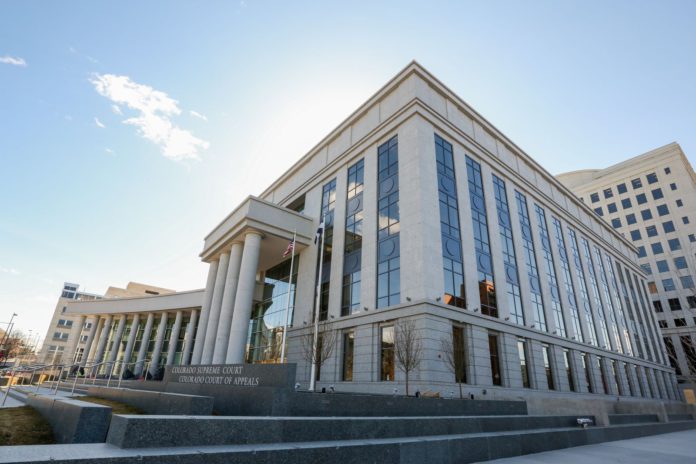
Colorado has new rules on deck that will control its judicial performance commissions and how they evaluate the state’s judges.
The Office of Judicial Performance Evaluation on Thursday posted online the Rules Governing Commissions on Judicial Performance, which outline the procedures for trial, appellate and senior judge evaluations as well as how the commissions generate their retention recommendations for voters.
Colorado is one of six states with judicial performance commissions that evaluate judges and issue recommendations to voters on whether they should be retained. The state and district commissions weigh judges on six categories: integrity, legal knowledge, communication skills, judicial temperament, administrative performance and service to the legal profession and public. Colorado’s Commissions on Judicial Performance are brought into being by legislation, which was due to sunset last year. When the General Assembly passed House Bill 17-1303 to renew the commission, it did so with new proposed rules and revisions.
What is different from the previous rulemaking process is that the bill gave the commission the authority to promulgate and approve new rules, and without the Colorado Supreme Court having the final say.
Instead of issuing recommendations of “retain” or “do not retain,” under the new rules the commissions would say that a judge “meets performance standards” or “does not meet performance standards.” A commission can only declare that a judge “does not meet performance standards” by majority vote.
The new rules also lay out requirements for Colorado’s Courtroom Volunteer Observation Program. Those requirements include eligibility criteria for the non-attorney volunteers as well as their terms of service.
Additionally, the final rules detail how a commission imposes a judicial improvement plan on a judge it determines is lacking in certain performance criteria.
Prior to finalizing the rules, the State Commission on Judicial Performance heard public input on the proposed rules on Jan. 22 at the Ralph L. Carr Colorado Judicial Center.
“We’ve tightened up and developed a more formalized evaluation process among the various judicial districts at the state level,” Edward Harvey, commission vice-chair and non-attorney, said at the meeting.
In his testimony, Chris Forsyth, a solo worker’s compensation attorney who formed the Judicial Integrity Project, criticized what he saw as an opaque procedure for weighing the proposed rules. The rules themselves constituted 11 pages of the document, and appended to them were the evaluation matrices and appellate judge evaluation criteria that made up another 165 pages.
Forsyth pointed out that the rule changes were not highlighted, so the public couldn’t easily tell what parts of the proposed rules were existing standards and what parts constituted the proposed changes.
“Instead, a 177-page document was lobbed on the internet, and people were supposed to dig through that and figure out where the changes were,” he said.
A link to the previous rules was inaccessible from the Office of Judicial Performance Evaluation’s website, though an electronic copy was available from the OJPE on request.
Harvey responded by saying that the proposed rules document had so many formatting changes from the existing rules that “it would be almost too indecipherable” to present it in the form of a redlined document.
Forsyth contested that Colorado, and the new rules, tip the scales too far in favor of retaining judges. For a judge to receive a “does not meet performance standards” determination requires a majority vote among the commission members. Forsyth called that “an incredulously favorable slant on this standard for judges.”
Forsyth also argued that the courtroom observer program, as it’s structured in the new rules, wouldn’t allow for objectivity. He said that in the proposed rules, the volunteer courtroom observers serve at the will of the OJPE’s executive director. “It’s ludicrous to think that anybody who has the slightest critique of a judge is going to get on one of these volunteer observers programs.” In the final rules, observers serve at the will of the OJPE, but not its executive director specifically.
Forsyth also called for anonymity for attorneys who complete surveys to evaluate judges. The requirement that survey takers enter their contact information in order to take the survey, he said, is intended to intimidate lawyers from completing them. “I don’t know how to convey to you the fear in the legal community for speaking up against a judge,” he said.
Commissioner and former Colorado Secretary of State Scott Gessler responded to Forsyth after the latter finished his comments. The evaluation surveys require personal information, Gessler said, because if they didn’t, someone either frustrated or happy with a judge may try to “goose the system” and submit multiple anonymous comments on that judge.
Other speakers weighed in with general critiques of the commissions and their evaluation processes. Robin Austin, an activist with Families Against Court Embezzlement and Unethical Standards, or F.A.C.E.U.S., said the commissions aren’t able to properly investigate the judges they evaluate for criminal histories or financial conflicts of interest because they don’t have access to certain information. “I don’t think that you’re empowered to do the job that you’re required to do.”
Austin called for cameras in the courtrooms for accountability. With proceedings being video-recorded, he said, “people who are in those courtrooms are guaranteed that the record that is made available to them has not been altered or edited by people behind the scenes or unscrupulous court actors who are able to do that.”
Luanne Fleming, also of F.A.C.E.U.S., said in her testimony that her organization has asked for cameras in the courtrooms, among other reforms, “to ensure judges are doing their jobs in a constitutional manner.”
In response, Gessler said he “would love” to have cameras in the courtroom, though more for the purpose of enabling better courtroom observation. He said he had once looked into it, and found that widely video-recording proceedings would be cost-prohibitive for the state. “Unfortunately … it gets really expensive really fast.”
— Doug Chartier

